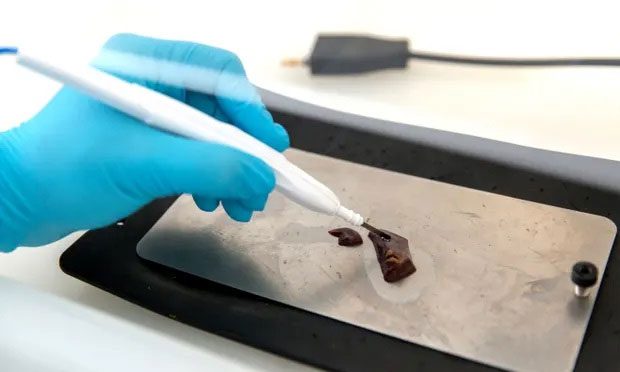Researchers have discovered a breakthrough device that can diagnose endometrial cancer in just seconds, enabling thousands of women to receive timely treatment.
According to The Guardian, endometrial cancer is the fourth most common cancer among women, affecting approximately 9,000 individuals each year in the UK. Alarmingly, only about 10% of those with symptoms suspected of having the disease are diagnosed in time through biopsy.
Now, experts at the Royal College of London have found that the iKnife—a device typically used for treating breast and brain cancer—can accurately detect endometrial cancer cells.

The iKnife developed by a team of researchers at the Royal College of London. (Photo: Thomas Angus/The Guardian)
This device is capable of detecting cancer cells by analyzing the smoke emitted from endometrial biopsy tissue as it is exposed to the tissue. This method is faster and easier to perform than traditional approaches, promising a new, accessible diagnostic method.
“iKnife is a reliable diagnostic method for endometrial cancer, providing results in seconds with up to 89% accuracy. This device addresses the issue of delayed diagnosis for women waiting for pathology results. These new findings in the study could pave the way for new diagnostic methods,” the research team stated in the journal Cancers.
The researchers demonstrated the effectiveness of the iKnife by using biopsy samples from 150 women suspected of having endometrial cancer. They then compared the results obtained with current diagnostic methods. The research team plans to initiate a large clinical trial, followed by making this device widely available.
Ms. Athena Lamnisos, CEO of the cancer charity Eve Appeal, which funded the research, stated: “The wait for test results is very stressful—especially if that test is to determine whether a patient has cancer.”
According to Ms. Lamnisos, a red flag symptom of endometrial cancer is postmenopausal bleeding, which should be tested immediately after a referral from a doctor. However, patients typically have to wait an additional two weeks to receive their test results.
“Therefore, the research supported by Eve has the potential to create a breakthrough in rapid cancer diagnosis. This is an effective method that helps alleviate patients’ anxiety. We understand how important this is for them,” she said.
Alison, 57, who lives in West London, experienced symptoms of endometrial cancer earlier this year but was ultimately found not to have the disease. She expressed that the iKnife would make a significant difference in her experience.
“I was one of the individuals with symptoms, but fortunately, it turned out not to be cancer. I was really frustrated having to wait nearly three weeks for results. I was also asked to come in person to receive the results. It would have been very different to know earlier that I did not have cancer and not have to wait three weeks for the results,” she shared.
Professor Sadaf Ghaem-Maghami, the lead researcher at the Royal College of London, noted that a diagnosis within seconds could allow women confirmed to have cancer to begin treatment sooner, while those who do not have the disease would not have to spend weeks worrying.


















































